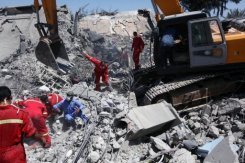 NATO defended the credibility of its air war in Libya after a bomb misfired killing civilians, as Libyan state media said the alliance had begun bombing highway traffic checkpoints.
NATO defended the credibility of its air war in Libya after a bomb misfired killing civilians, as Libyan state media said the alliance had begun bombing highway traffic checkpoints."I would suggest that our reputation and credibility is unquestionable," said Wing Commander Mike Bracken, the mission's military spokesman.
"What is questionable is the Kadhafi regime's use of human shields, (and) firing missiles from mosques," Bracken told reporters from operation headquarters in Naples, Italy.
He stressed that NATO had taken pains to avoid civilian casualties in its three-month campaign in Libya .
The comments came after NATO admitted a bomb misfired in Tripoli at the weekend, killing nine people according to Moamer Kadhafi's regime.
Italian Foreign Minister Franco Frattini warned that NATO's credibility was "at risk" following the civilian casualties, and urged it to ensure it was not providing ammunition to Kadhafi's propaganda war.
"We cannot run the risk of killing civilians. This is not good at all," Frattini said at a meeting of European foreign ministers.
The blunder -- an embarrassment for a mission that prides itself on protecting Libya's people from the regime -- came on the heels of a friendly fire incident last week in which a column of rebel vehicles were hit by NATO warplanes.
Bracken rejected a regime claim of further civilian casualties, however, reiterating that an air strike in the western Tripoli suburb of Sorman on Monday hit a legitimate military target.
"If you look at our track record, we have taken utmost care to avoid civilian casualties and we will continue to do so," said NATO spokeswoman Oana Lungescu.
British Prime Minister David Cameron butted heads with his own brass over the campaign Tuesday after top officers warned that the military is overstretched.
After speaking with the heads of the army and navy, Cameron said: "They are absolutely clear that we are able to keep up this mission for as long as is necessary, and that time is on our side, not on Kadhafi's side."
In Brussels, NATO said it lost radar contact with a drone helicopter conducting a reconnaissance flight over Libya on Tuesday.
"This drone helicopter was performing intelligence surveillance and reconnaissance over Libya to monitor pro-Kadhafi forces threatening the civilian population," military spokesman Mike Bracken said in a statement.
In Washington, defence officials said the aircraft was a Fire Scout, but could not confirm whether it had been shot down or suffered mechanical or communications problems.
Libyan state television showed footage of a burnt-out helicopter it identified as an Apache, reportedly downed near Zliten, 160 kilometres (100 miles) east of the capital.
The caption on the television, which quoted military sources, read: "Images of the Apache helicopter shot down by the people's army."
The Pentagon had previously announced the deployment of two armed Predator drones for the NATO-led air campaign against Kadhafi's forces, but had not previously cited any role for an unmanned helicopter.
State television and official news agency JANA reported early Wednesday that NATO warplanes had carried out raids on the towns of Khoms and Nalut in western Libya.
NATO targeted two checkpoints in the Khoms region 120 kilometres (75 miles) east of Tripoli, the television report said. It added that the control points were "civilian" intended to "organise traffic movements."
If the strikes were confirmed, it would mean the Western alliance had moved into a new stage of operations in the west of Libya, aiming at checkpoints on the highways leading into the capital Tripoli.
Until now, NATO had limited itself to attacks on military installations and armour.
JANA reported raids on Al-Ghazaya in the Nalut region southwest of Tripoli. This region has for months been the scene of violent clashes between rebels and troops loyal to Kadhafi.
Advocacy group Human Rights Watch meanwhile accused Kadhafi's forces of laying land mines in the strategic Nafusa mountains near the border with Tunisia to counter rebel attacks there.
0 comments:
Enregistrer un commentaire